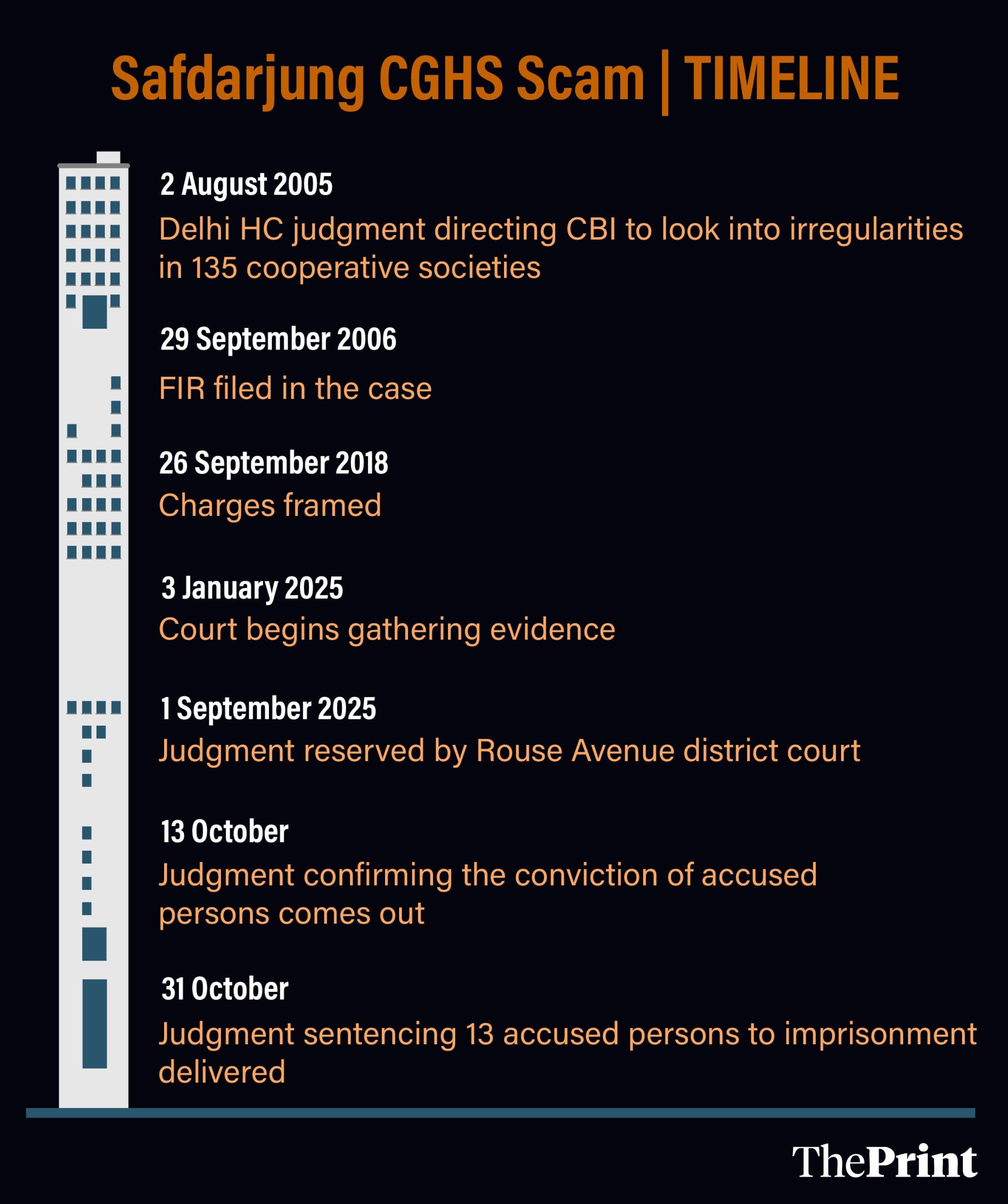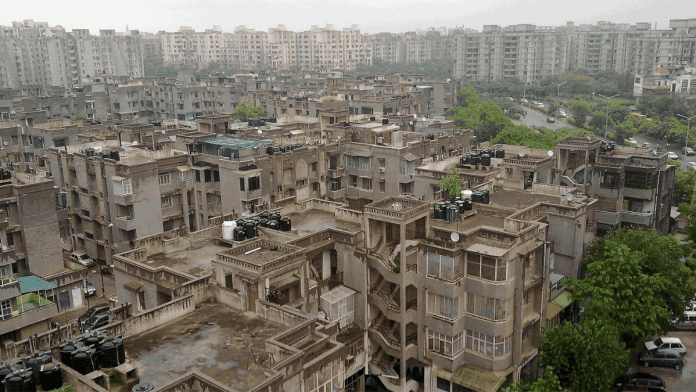New Delhi: A Delhi court last month convicted 13 people, including a former IAS officer, in a case where defunct societies were revived through forged records to secure land at rates far below market prices.
The Safdarjung Cooperative Group Housing Society (CGHS) case, part of a larger Rs 4,000-crore racket involving 135 societies, dates to 2005, when Delhi High Court first flagged illegalities and ordered the Central Bureau of Investigation (CBI) to conduct a full inquiry.
Twenty years later, the conviction offers a detailed account of how manipulation, forgery, and fabrication of cooperative society records facilitated illegal land allotments from the Delhi Development Authority (DDA).
The court said the documents in this case had opened a “Pandora’s box” of illegalities and such instances of corruption needed to be dealt with an “iron hand”.
Among the 13 convicts is former IAS officer Narender Kumar, who retired in 2017. He was sentenced to five years’ rigorous imprisonment, along with an additional sentence of six months. The court also ordered him to pay a fine of Rs 1.5 lakh in connection with offences, including cheating, forgery, using forged documents as genuine, and criminal misconduct by a public servant under Indian Penal Code and Prevention of Corruption Act.
Other convicts included office-bearers of the cooperative society: Vijay Thakur (president), Vikas Madan (secretary), Poonam Awasthi (treasurer), and Narinder Dhir (executive member).
The ruling, authored by judge Prashant Sharma, was delivered in two parts. The first, a 591-page order delivered on 13 October, dealt with the conviction of the accused and reasons for it. The second, a 79-page order dated 31 October, dealt with the sentencing.
Also Read: Drawing clear line on autonomy of tribunals, SC scraps 2021 Act, calls it ‘legislative override’
How the case began
Scores of cooperative societies were registered in the city in the decades before, but many of these became ‘defunct’ as the Delhi Development Authority (DDA) did not allot land to them.
The accused allegedly exploited Delhi Cooperative Societies Rules, which have provisions to revive these defunct societies, to eventually get land at subsidised rates. The Rules fall under the Delhi Cooperative Societies Act,1972.
In August 2005, Delhi High Court took note of alleged irregularities related to 135 cooperative societies and observed that there appeared to be connivance between builders and officials of the Registrar Cooperative Societies and DDA. It then directed CBI to form a special investigation team (SIT) to probe the functioning of these societies.
Based on the HC’s directions, CBI registered an FIR in 2008. A Delhi court consequently summoned the accused in connection with the Safdarjung case. It said its summonses should have cautioned the accused but they failed to properly gauge the gravity of the matter.
It also rejected the argument by the accused that the FIR against them was motivated, saying that the HC’s 2005 order pointed to the fact that this case was “a serious affair”.

What prosecution argued
Terming the investigation a “tough challenge” for CBI, the court of judge Sharma said that the documents, which served as evidence against the accused, were prepared by members of the society several years ago.
Members and officers of Registrar Cooperative Societies (RCS) were silent and did not disclose the facts regarding the working of the Safdarjung CGHS society, the court noted, while adding that no one except them had any knowledge about the society’s working.
“Thankfully, documents of society in question were available,” the court noted, adding that these documents opened a “Pandora’s box” of illegalities, manipulations, cheating, forgery, and fabrication of records by the accused.
The case was built on the oral testimonies of witnesses, the testimony of a handwriting expert, who was a government official with over 42 years of experience. The expert told the court that several signatures in the society records were forged.
Some accused told the court they were illiterate and could only write their names in Hindi. However, the society records, which contained their English signatures, led the expert to conclude that these documents were signed by someone well versed in English.
Why defence couldn’t prove innocence
The judge noted that the accused offered no “plausible or reasonable explanation” for the manipulation of records.
Judge Sharma also referred to a “meeting of minds” to forge and falsify the society’s records to secure its revival illegally for the allotment of land. He said the conduct of the accused throughout the trial was evasive, consistently projecting that they did not know anything about the prosecution’s case.
“None of the accused persons gave any explanation whatsoever regarding blank spaces and manipulations in the records of society, during trial,” the order read.
“Since accused persons had the occasion to go through said records, prior to investigation, they should have explained the reasons behind said blank spaces and manipulations in the records of society,” it added.
“Their conduct during trial reflected that they were hiding truth from the court with ulterior motives,” the court noted.
The judge said that the accused couldn’t answer several questions: why the CBI would falsely implicate them in this case, why the records and registers were not filled completely, why elections were not conducted, or what was the reason for forgery of documents.
The court noted that the accused’s lack of awareness led to their not cross-examining the prosecution witnesses. They also could not provide any proper explanations for the incriminating evidence presented against them, the court said.
Some of the explanations they offered were “unbelievable”, the court noted, while adding that the accused failed to understand that the concept of cooperative societies is rooted in the belief of benefiting the public at large.
These accused could have lifted the “veil of allegations” against them, but failed to do so, the court noted.
“They could have lifted the veil of allegations, levelled against them by disclosing true facts, as per their version. They failed to do so for reasons best known to them. It did not help their cause. Such members cannot simply brush aside the manipulations in the records of society, just like that. They cannot shift the burden of proving the manipulations in the said records on prosecution,” the court said.
Pointing out that the accused knew what they were doing and had personal interests or stakes in the matter, the court said this was why they could not offer any plausible or believable defence.
(Edited by Sugita Katyal)
Also Read: Infra projects worth over Rs 1 lakh cr completed or under way—Gadkari on Delhi decongestion plan






